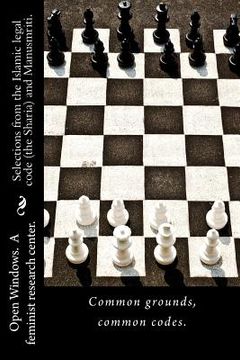Selections from the Islamic legal code (the Sharia) and Manusmriti.: Common grounds, common codes. (in English)
Synopsis "Selections from the Islamic legal code (the Sharia) and Manusmriti.: Common grounds, common codes. (in English)"
This book has selections from the Sharia and Manusmriti; even though these legal texts were written about 400 years apart, uncannily enough, they sound quite similar. There is a section in the Sharia (written post 700 AD) that has rules about how women should cover their bodies during prayers: Issue 797: A woman should cover her entire body while offering prayers, including her head and hair. As a recommended precaution, she should also cover the soles of her feet. It is not necessary for her to cover that part of her face which is washed while performing Wudhu, or the hands up to the wrists, or the upper feet up to the ankles. Nevertheless, in order to ensure that she has covered the obligatory parts of her body adequately, she should also cover a part of the sides of her face as well as lower part of her wrists and the ankles.Similarly, there are many sections in Manusmriti (written around the 2nd-3rd century AD) which codify behaviour for women. -By a girl, by a young woman, or even by an aged one, nothing must be done independently, even in her own house. -In childhood a female must be subject to her father, in youth to her husband, when her lord is dead to her sons; a woman must never be independent. -She must not seek to separate herself from her father, husband, or sons; by leaving them she would make both (her own and her husband's) families contemptible. -She must always be cheerful, clever in (the management of her) household affairs, careful in cleaning her utensils, and economical in expenditure. -By a girl, by a young woman, or even by an aged one, nothing must be done independently, even in her own house. -She must not seek to separate herself from her father, husband, or sons; by leaving them she would make both (her own and her husband's) families contemptible. -She must always be cheerful, clever in (the management of her) household affairs, careful in cleaning her utensils, and economical in expenditure. The intent of these legal texts - both Islamic and Hindu - was to control all aspects of a woman's behaviour.

